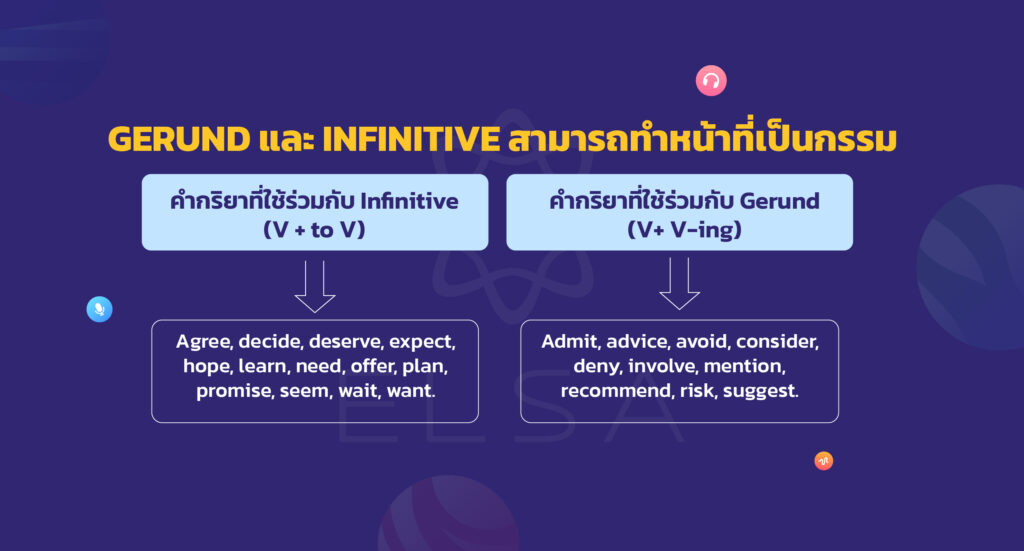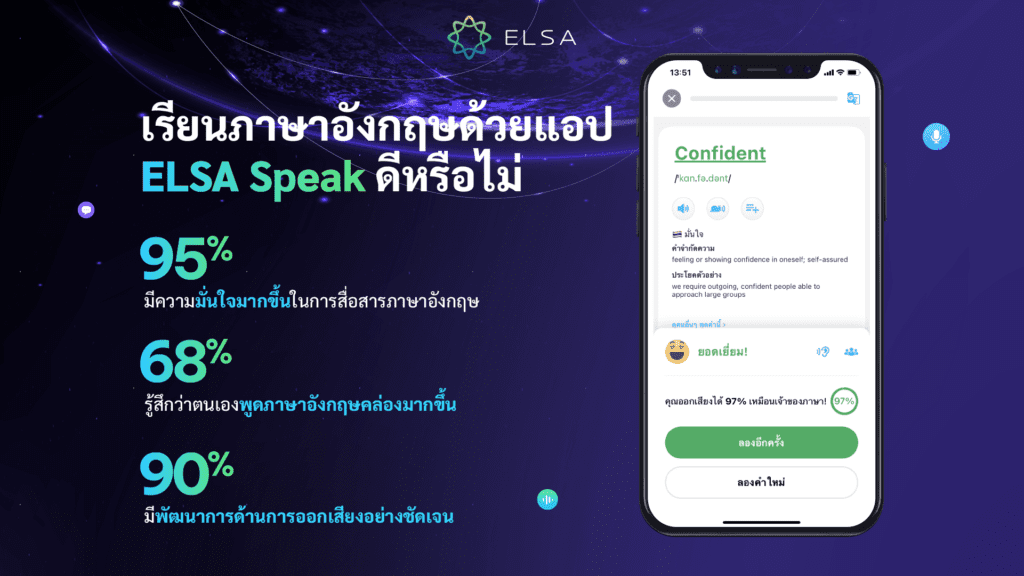Gerund และ Infinitive (กริยานามและกริยาช่อง 1) ทั้ง 2 ประเภทนี้สามารถทำหน้าที่เป็นประธาน เป็นกรรมเพื่อขยายคำกริยาของประโยค แต่ว่า 2 โครงสร้างเหล่านี้มีการใช้ที่แตกต่างกันและด้านล่างนี้คือหลักการใช้ Gerund และ Infinitive ที่ถูกต้องที่สุด มีตัวอย่างช่วยให้คุณเข้าใจง่ายมากขึ้น
Gerund และ Infinitive คืออะไร?
Gerund คืออะไร? Gerund (กริยานาม) คือคำศัพท์ที่มีโครงสร้างของคำกริยาแต่ทำหน้าที่เป็นคำนามของประโยค เข้าใจง่ายๆ กริยานามคือกริยาที่นำมาเติม –ing เพื่อกลายเป็นคำนาม
สอบก่อนเข้าฟรี

Infinitive (กริยาช่อง 1) คือคำกริยาในรูปปกติ ที่ไม่มีการเติมเสริมแต่งใดๆ หนึ่งในนั้น กริยาช่อง 1 แบ่งเป็น 2 ประเภท คือ มี “to” และไม่มี “to”
หลักการใช้ Gerund และ Infinitive ในภาษาอังกฤษ
Gerund สามารถทำหน้าที่เป็นประธานของประโยค
หากคุณต้องการใช้คำกริยาเป็นประธานของประโยค ต้องใช้ภาพของ Gerund
ตัวอย่างประโยค
- Becoming a doctor is my childhood dream.
- Running is my favorite activity.
Gerund และ Infinitive สามารถทำหน้าที่เป็นกรรมของประโยค
เมื่อใช้ร่วมกับคำกริยาบางอย่าง ทั้ง Gerund และ Infinitive สามารถทำหน้าที่เป็นกรรม ในกรณีนี้ คุณต้องท่องจำให้ถูกต้องว่า คำกริยาใดสามารถใช้ร่วมกับ gerund และคำกริยาใดสามารถใช้ร่วมกับ infinitive ได้
คำกริยาที่ใช้ร่วมกับ Infinitive (V + to V): Agree, decide, deserve, expect, hope, learn, need, offer, plan, promise, seem, wait, want.
ตัวอย่างประโยค
- I agree to go with her.
- I decided to finish my work today.
For all those things, she deserves to be respected.
คำกริยาที่ใช้ร่วมกับ Gerund (V+ V-ing): Admit, advice, avoid, consider, deny, involve, mention, recommend, risk, suggest.
ตัวอย่างประโยค
- I avoid asking her about her husband.
- She recommends eating this dish.
- I consider going suburban this weekend.

Gerund และ Infinitive สามารถใช้ตามหลังคำคุณศัพท์
Infinitive สามารถใช้ตามหลังคำคุณศัพท์เพื่อชี้แจงความหมายของคำคุณศัพท์นั้น
ตัวอย่างประโยค
- It is so hard to become a professor.
- You are so nice to help her.
เมื่อใช้ Infinitive ตามหลังคำคุณศัพท์ที่อ้างถึงบุคคล
สำหรับหลักการใช้ Gerund และ Infinitive เพียงแค่มี Infinitive ตามหลังคำคุณศัพท์ที่อ้างถึงบุคคลในนั้น คำกริยาที่ได้ตามหลังคำคุณศัพท์ที่อ้างถึงบุคคล ได้แก่ ask, expect, hire, invite, order, remind, require, teach, tell, warn.
ตัวอย่างประโยค
- My friend invites me to attend her birthday party.
- My mom told me to stay at home.
เมื่อใช้ Gerund ตามหลังคำบุพบท
แค่มี Gerund ตามหลังคำบุพบท (prep + V-ing)
ตัวอย่างประโยค
- He is not interested in attending a meeting.
- Thanks for coming.
สังเกตว่า หลังคำบุพบท 2 คำ “except” และ “but” คำกริยาต้องแบ่งเป็นรูปปกติที่ไม่มี to
ตัวอย่างประโยค
- I could do nothing except agree.
- He did nothing but complain.
>>> Readmore:
- คำกริยา (Verb) คืออะไร? การจำแนกรูปแบบคำกริยาในภาษาอังกฤษ
- Verb to be คืออะไร? หลักการใช้ verb to be กับแต่ละ tense
- หลักการเติม ing ที่ใช้กันทั่วไปในภาษาอังกฤษ

กรณีพิเศษ
ในคำกริยาพิเศษ บางคำสามารถตามหลัง gerunds หรือ infinitive และก็มีบางคำใช้ได้กับทั้งสอง ความแตกต่างในการใช้จะขึ้นอยู่กับความเหมาะสมของสถานการณ์
ไม่เปลี่ยนความหมายหรือเปลี่ยนความหมายของกริยาหลักเล็กน้อย
เหล่านี้คือคำกริยาต่อไปนี้ start, begin, continue, love, like, prefer คุณสามารถใช้ทั้ง V-ing หรือ to V
ตัวอย่างประโยค
- I like watching TV.
- I like to watch TV.
สำคัญกว่า:
like/love/prefer + V-ing หรือ like/love/prefer + to V
แต่ would like/would love/would prefer + to V
เปลี่ยนความหมายของกริยาหลัก
นั้นคือ
REMEMBER และ FORGET
- remember / forget + V-ing: จำ / ลืมบางสิ่งบางอย่างที่เกิดขึ้นแล้ว (ในอดีต)
- remember / forget + to V: จำ / ลืมสิ่งที่ยังไม่เกิด หรือ กำลังจะเกิดขึ้น (ในอนาคต)
ตัวอย่างประโยค
- I remember reading the book last month.
- I remember to turn off the light before leaving home.
STOP
- stop + V-ing: หยุดสิ่งที่กำลังทำอยู่
- stop + to V: หยุดเพื่อก้าวไปสู่สิ่งอื่น
ตัวอย่างประโยค
- She stopped talking when the kid cried.
- On the way to the office, I stopped at a coffee shop to buy a cup of coffee.
TRY
- try + V-ing: ลองทำอะไรบางสิ่ง
- try + to V: พยายามทำอะไรบางสิ่ง
REGRET
- regret + V-ing: เสียใจกับสิ่งที่ทำ
- regret + to V: ขอโทษที่กำลังจะทำอะไรบางอย่าง (ประกาศข่าวร้าย)
NEED
- need + V-ing = need + to be P2: จำเป็นต้องถูกทำ (เฉยๆ)
- need + to V: ต้องทำ (เชิงรุก)
REFUSE
- refuse + V-ing: ปฏิเสธที่เคยทำอะไร (การกระทำได้เกิดขึ้นแล้ว)
- refuse + to V: ปฏิเสธที่ไม่อยากทำอะไร (การกระทำจะไม่เกิดขึ้น)
GO ON
- go on + V-ing: ทำสิ่งที่กำลังทำต่อไป
- go on + to V: ทำงานใหม่ต่อไปหลังจากเสร็จสิ้นงานปัจจุบัน
MEAN
- mean + V-ing: มีความหมายว่า เกี่ยวข้องกับ
- mean + to V: มีเจตนา มีแผนที่จะทำอะไร
ใช้ตามหลังคำกริยาที่แสดงประสาทสัมผัสการรับรู้และกรรม: hear, sound, smell, taste, feel, watch, notice, see, listen, find .. + O + V-ing เพื่อระบุช่วงเวลาที่การกระทำกำลังเกิดขึ้น
ใช้ตามหลังคำกริยาที่แสดงประสาทสัมผัสการรับรู้และกรรม: hear, sound, smell, taste, feel, watch, notice, see, listen, find .. + O + V เพื่อบ่งบอกถึงความสมบูรณ์ของการกระทำ – ได้ยินหรือเห็นสิ่งทั้งหมดเกิดขึ้น
แบบฝึกหัดใช้กับการใช้กริยานามและกริยาช่องที่ 1
แบบฝึกหัดที่ 1: เติมประโยคให้สมบูรณ์ด้วย gerund หรือ infinitive
1. She decided (move) in another city.
2. Grammarbank is one of the best websites (practice) English grammar.
3. Alicia enjoys (watch) soap operas on television.
4. She refuses (listen) to her father.
5. Students want (get) good grades.
6. Many drivers avoid (drive) in traffic.
7. Do you feel like (eat) hamburgers?
8. I can’t imagine (jump) out of a flying jet.
9. The president wishes (end) the war.
10. I would love (see) that movie. I heard it’s really good.
คำตอบ: 1. To move, 2. To practice, 3. Watching, 4. To listen, 5. To get, 6. Driving, 7. Eating, 8. Jumping, 9. To end, 10. To see.
แบบฝึกหัดที่ 2: เลือกคำตอบที่ถูกต้อง
1. My friend really enjoys… books and magazines.
A. To read
B. Reading
C. reads
2. … enough sleep is very important for good health.
A. Getting
B. Get
C. gets
3. … is not allowed inside the building. You should go outside.
A. Smoke
B. Smokes
C. Smoking
4. I love … a cup of tea in the early afternoon.
A. To drink
B. Drink
C. To drinking
5. Larry insisted on … to his lawyer after the accident.
A. Talking
B. To talk
C. talks
6. I really hate … on holidays and weekends.
A. Working
B. To work
C. Both of the answers are correct.
7. … along the beach is a great way to relax.
A. Walk
B. Walking
C. walks
8. Do you like … Italian food?
A. Eating
B. Eat
C. Both of the answers are correct.
9. I think that … a second language is fun.
A. Learn
B. Learning
C. To learning
10. Steven doesn’t know how … so he takes a bus to work.
A. To drive
B. Driving
C. Drives
คำตอบ
| 1 | 2 | 3 | 4 | 5 | 6 | 7 | 8 | 9 | 10 |
| B | A | C | A | A | C | B | A | B | A |
ฝึกฝนการใช้ Gerund และ Infinitive ในการสื่อสารภาษาอังกฤษกับ ELSA Speak
การฝึกฝนกฎการใช้ Gerund และ Infinitive จะช่วยคุณได้อย่างมากในการฝึกฝนทักษะการเขียนและการพูดภาษาอังกฤษเหมือนเจ้าของภาษา อย่าลืมฝึกฝนเยอะๆ เพื่อจำหลักไวยากรณ์นี้ นอกจากการปรับปรุงไวยากรณ์แล้ว การฝึกการสื่อสารภาษาอังกฤษยังเป็นข้อกำหนดบังคับหากคุณต้องการพูดภาษาอังกฤษได้อย่างคล่องแคล่ว ดังนั้น ใช้เวลาอย่างน้อย 10 นาทีต่อวันในการฝึกฝนกับ ELSA Speak หลังจาก 3 เดือน คุณจะรู้สึกมั่นใจมากขึ้นอย่างแน่นอน






